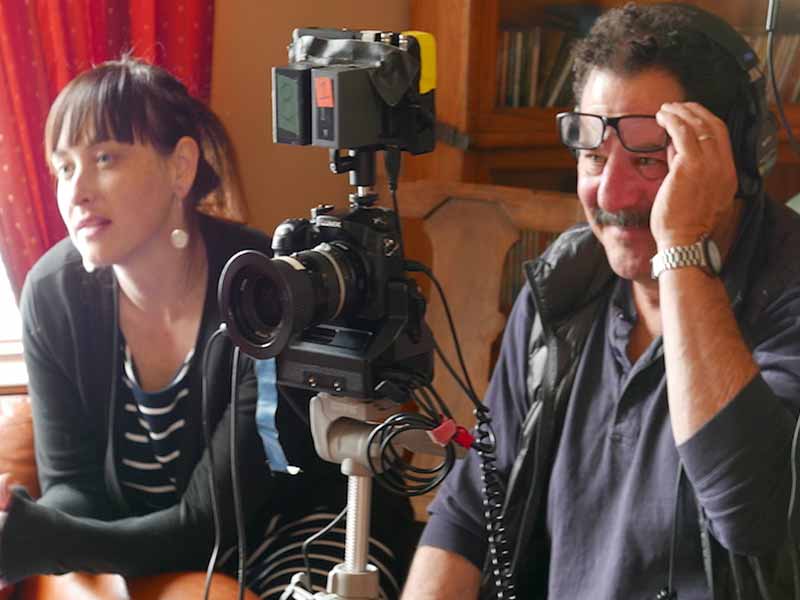Filmmaker Jeff Hoffman hopes to solicit funds to complete an ambitious historical documentary that sheds light on the Jewish and non-Jewish international volunteers, Machalniks, who risked their lives for the establishment of the State of Israel.
Hoffman, a documentary cinematographer and producer – and a dual Canadian and American citizen who made a career for himself in Hollywood and Vancouver – said it was his grandfather who inspired him to produce a film called Four Million Bullets: The Untold Fight for Survival, in part about the role Machalniks played in helping Israel gain its independence.
“My grandfather was a Zionist from New England who would go to Israel in the ’50s, and he donated work trucks – he was an upholsterer. The kibbutzes and IDF would use them as ambulances,” Hoffman explained.
“He was a hobby photographer, and he shot 100 hours or so of 8-mm movies throughout Israel and he left them to me. I’ve had them for years and I digitized them.”
Hoffman said his grandfather’s film, as well as a conversation he had with his dentist about a secret bullet factory called Machon Ayalon in Rehovot in pre-state Israel, inspired him to look deeper into the circumstances that led to Israel’s independence.
“Under penalty of death, Palestinian Jews were not allowed to produce arms under the British,” Hoffman said.
During an interview with Shlomo Hillel, an Iraqi-born Israeli diplomat and politician who immigrated to Palestine in 1934, Hoffman learned about Hillel’s involvement in operating a secret bullet factory hidden beneath a bakery and laundry facility when he was 18 years old.
“The Jews had no weapons, no airplanes, no ships. They had nothing. All they had were refugees from the Holocaust and 600,000 Jews to fight 50 million Arabs. For three years, this bullet factory operated under the noses of the British, run by 17- and 18-year-old girls and boys,” Hoffman said.
Hoffman teamed up with Divvy Ahronheim, who works as his associate producer from Montreal, and began making connections with Canadian Machalniks, including Joe Warner and Jerry Gross, as well as historian Irving Abella, and Quebec politicians Lawrence Bergman and Jacques Saada.
“I’ve been on this for 11 months, and I’ve seen everything on the subject. People like Nancy Spielberg did a film called Above and Beyond, which was on the [birth of the Israeli] air force, and there have been half a dozen other attempts [to produce a similar film],” Hoffman said.
He feels that his film, for which he is raising $50,000 to move forward with the editing process, is the only one that explores in depth the circumstances in what is now Israel that led to the civil war from 1946 to 1948, the War of Independence in 1948, and organizations such as the Sonneborn Institute, which was founded by the late American Zionist Rudolph Sonneborn, to send supplies to the Haganah, Israel’s pre-state militia.
Ziv Nevo Kulman, consul general of Israel in Montréal, endorsed the project, calling it “an ingenuous undertaking, which seeks to tell the stories of the unsung heroes of Israel’s War of Independence, and more specifically, those of the brave Machal volunteers from the United States, Canada and elsewhere, who left everything they knew to fight for the survival of the newly born Jewish state.”
Hoffman believes that the story of the Machalniks is not nearly as prominent in the Israeli historical narrative as it should be.
He interviewed Ralph Lowenstein, dean emeritus of the College of Journalism and Communications at the University of Florida, who volunteered to serve in the IDF when he was 18.
“He wrote a piece about why the world doesn’t know about Machal,” Hoffman said. “The native sabras, the Palestinian Jews weren’t too happy with the fact that they had to accept the support of all the volunteers who came in… The experience came from Canadian pilots and the 4,400 Machalniks from the U.S. and Canada, South Africa – 48 countries. They had just gotten out of World War II, so they had the experience to fight and to teach others how to fight,” Hoffman said.
“Also, it was illegal. In the U.S., you could have lost your citizenship or been executed. In Israel you could have been executed. In Canada, interestingly enough, Canadians were allowed to do this… It was possible for them to volunteer without losing their citizenship,” he said.
“We talked to a number of Americans who, under the penalty of losing their citizenship, they still did it… It was just something they did.”
Hoffman said he is passionate about this project and hopes to submit it to film festivals once it is completed.
“And I want to get it into every library and Jewish community centre in North America and Israel. That’s my goal. And every day, I get up at 8 o’clock in the morning and I work until late in the night, and this is all I do,” he said.
For more information, visit www.squashhouse.net/4-million-bullets
